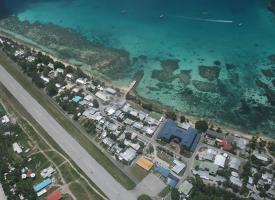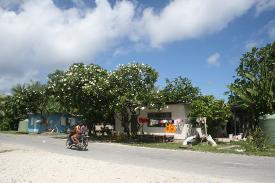

Climate adaptation
Remembering rights to land and culture in discussions of ‘climate refugees’


The human dimensions of climate change
Kofi Annan, in a recent report, The Anatomy of a Silent Crisis, described the suffering of millions of people being uprooted or permanently on the move as a result of climate change. The UN Intergovernmental Panel on Climate Change (IPCC) noted in 1990 that the single greatest impact of climate change will be relocation, with millions of people displaced due to shoreline erosion, coastal flooding and disruptions to agriculture.
Renowned ecologist and academic, Norman Myers has written extensively on the links between displacement and environmental decline, and has estimated there to be 200 million 'climate refugees' by 2050, a figure that has also been used by the IPCC and in the Stern Review on the Economics of Climate Change.
The impact of climate change on human displacement is the object of increasing attention from the media, NGOs and researchers. Yet governments and the international community as a whole are still far from providing active leadership and addressing the human development challenges related to climate change.
Institutional politics at the UN have obviated the need for an international policy to protect 'climate refugees', leaving a segment of the population vulnerable, without recourse to intervention from governing agencies.
Resistance to the 'climate refugee' tag
However, the category of 'climate refugees' is not unproblematic. As while it seems appropriate for responding to a problem, it leaves open the option that major industrial powers can continue to engage in unsustainable practices and crucially, it fails to consider the human rights of self-determination including peoples' ability to survive and live on their own land.
Based on interviews conducted in 2004 (with Pacific ambassadors to the UN) and 2008 (with Government officials and locals in Tuvalu), the dominant sentiment was for climate change to be curbed to prevent people fleeing their home. For interviewees, the imminent threat and severity of impacts were real; however exodus was not an option as they strongly resisted the imposition of the 'climate refugee' category, arguing instead for acknowledgement as citizens of an independent and sovereign nation, with rights to land and culture.
The 'climate refugee' tag has the potential to send a message that mitigation is not as important as adaptation, simply because if adaptation is equated with relocation then there is little premise to persuade major polluters to mitigate. While such positions stem from nationalism and cultural pride, they are also multilateral geopolitical assertions, given the small contributions of Pacific states to the problems of climate change.
The issue of 'climate refugees' is serious but is also filled with
complexities and contradictions. On the one hand, it is appropriate
to consider that 'climate refugees' need protection and relocation
options. On the other hand, it might lessen the demand for major
polluters to curb their greenhouse gas emissions knowing that the
'solution' in the form of relocation is forthcoming.
At worst, the 'climate refugee' category reduces the ability of Pacific nations to pressure for change. While many think that claims to climate-induced displacement and asylum are a corrective to injustice, we need to consider these cultural and political arguments concerning identity, place and self-determination.
Pacific representatives and citizens interviewed did not deny the environmental problems capable of producing refugees; however they acted in the interests of state sovereignty and asserted their rights to land and culture, and importantly a future of their choosing.
If you would like to find out more, please contact Karen McNamara at info@greencrossaustralia.org
Copyright © Green Cross Australia | Terms & Conditions | Privacy Policy
web design brisbane :: (zero)seven
